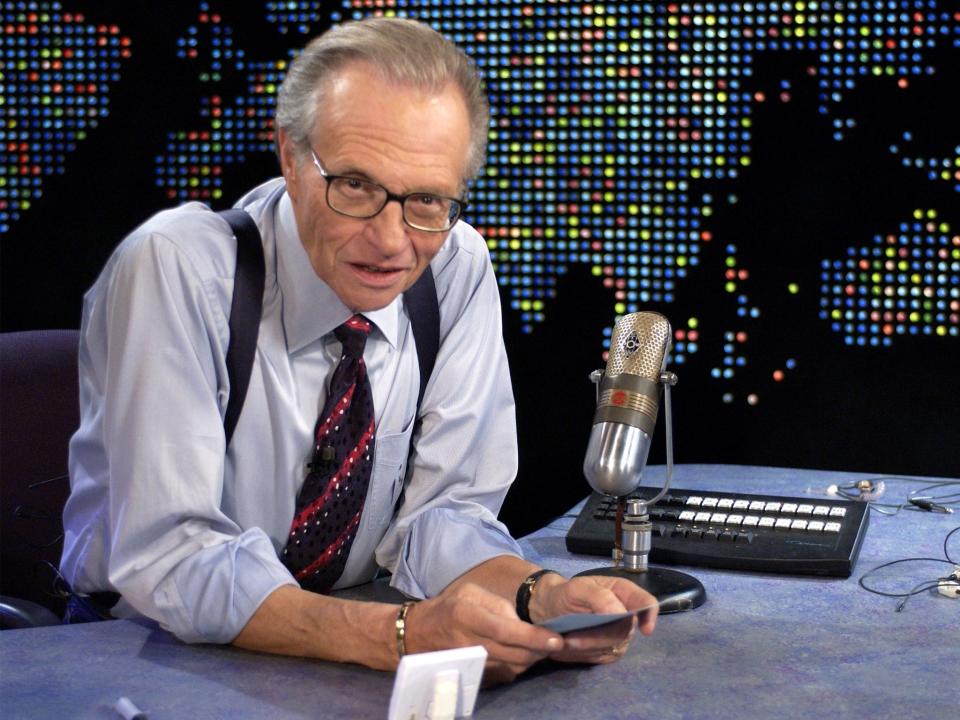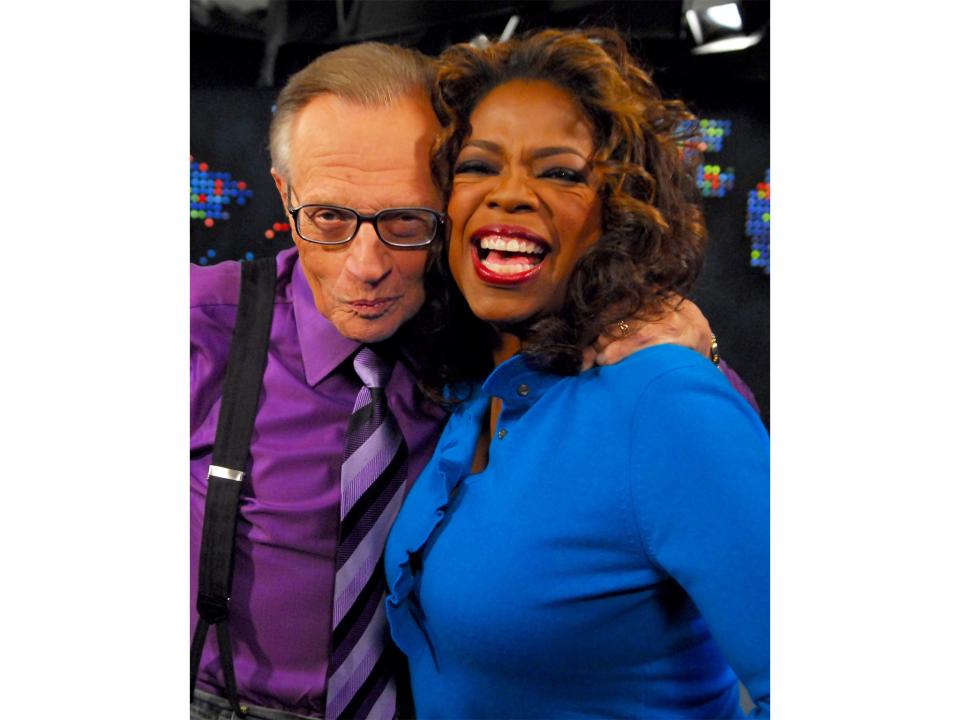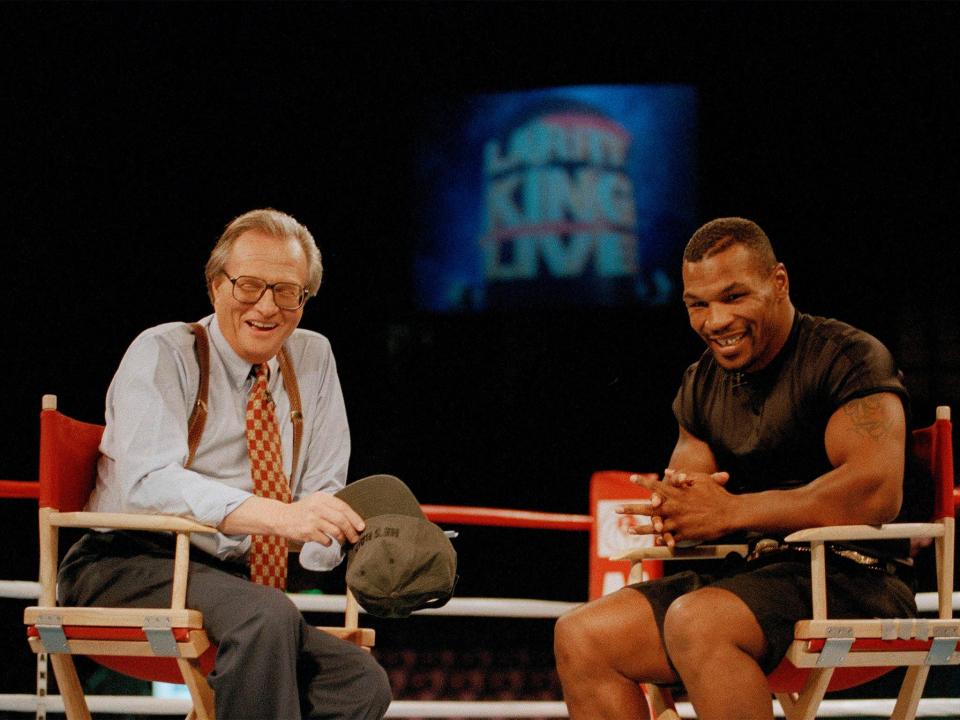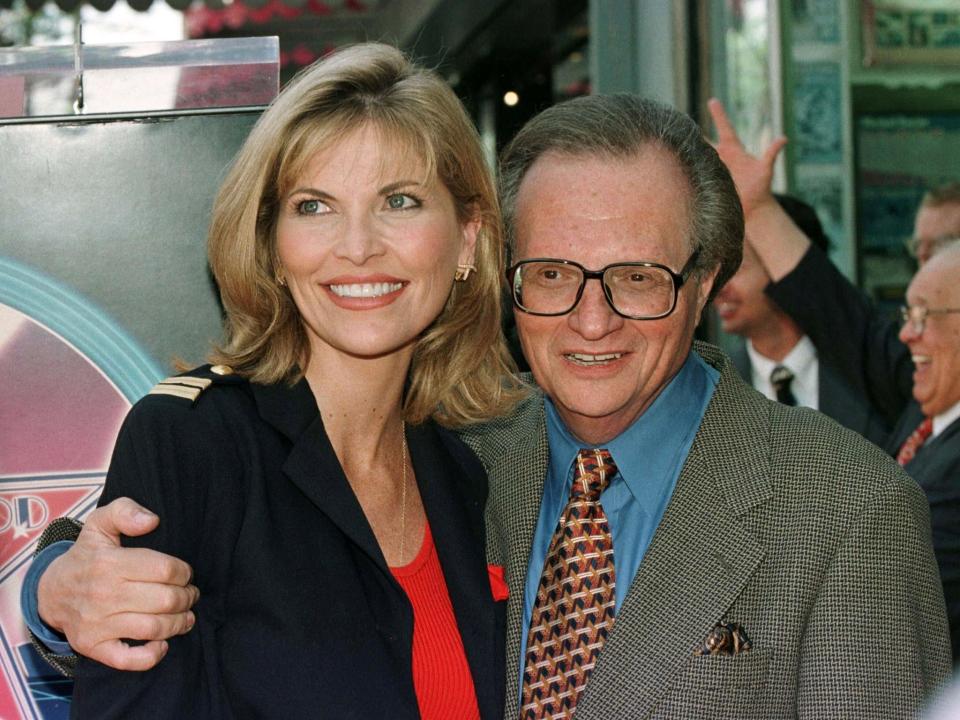Larry King: Legendary talk show host who interviewed everyone from world leaders to movie stars

King had a gift for reflecting popular sentimentality
(Getty)Larry King was the suspenders-sporting everyman whose broadcast interviews with world leaders, movie stars and ordinary Joes helped define American conversation for a half-century.
King died aged 87 at Cedars-Sinai Medical Centre in Los Angeles, Ora Media, the studio and network he co-founded, tweeted. No cause of death was given but CNN reported on 2 January that King had been hospitalised for more than a week with Covid-19.
Shortly after he became president, Bill Clinton went as a guest to the annual dinner of radio and TV correspondents in Washington. “You know why I can stiff you?”, he said. “Because Larry King liberated me by giving me to the American people direct.”
A broadcaster for more than 40 years, Larry King was given every award the American television industry has to offer, many of them several times. He was one of only three broadcasters to have his name set in a metal star in the pavement outside Grauman’s Chinese Theatre with the great stars of Hollywood. He was justly called a “master interviewer” and, more whimsically, “the Muhammad Ali of the broadcast interview”.
He was something more and less than that: the best and the worst of American television. For 36 years, in a society which values celebrity, which is to say being famous for being famous, above all other worldly goods, King made himself the ultimate arbiter of who made it in politics and show business.
He became literally as well known as presidents and Hollywood goddesses, megastars in sports and music. One famous cartoon showed two children saying “Let’s play ‘presidential politics’. You be the candidate, and I’ll be Larry King”.
Oprah Winfrey, perhaps his closest rival for television fame in his prime, once flattered him by saying she had been on holiday in Botswana, where her lion tracker hadn’t heard of Michael Jordan, the highest-paid basketball player in American history, hadn’t heard of her, but had heard of Larry King.
In politics his influence was formidable. “When it’s campaign time in America”, said the Associated Press, “Larry King ranks with the cherry blossoms as a ritual of the Washington spring.” His interviews were especially courted, not feared, by candidates for office. But he also tackled issues of policy, though in a cautious, middlebrow way.
The bad-tempered 90 minute debate about the North American Free Trade Area with vice president Al Gore and Ross Perot in 1993 not only drew the biggest audience in American cable television history since the Gulf War: it was the first time a public official of the vice president’s stature had ever debated public policy on live television.

Over the years Larry King interviewed almost every major celebrity from politics and show business: Bill and Hillary Clinton (in the White House) on more than one occasion, Margaret Thatcher, Mikhail Gorbachev, Jacques Chirac, Yasser Arafat, but also Bob Hope, Barbra Streisand, OJ Simpson. Frank Sinatra told him, “on my mother’s soul”, that he trembled every time he went on stage. Marlon Brando kissed him on the lips. Mike Tyson told him how he was beaten up in jail.
He treated everything as show business. Once he introduced the US defense secretary, the less scintillating Dick Cheney, and said in the same breath that his guests next week would be the Muppets.
Sharp-featured, with hair brushed back off his forehead, his trade marks were horn-rimmed glasses and braces, of which he owned 150 pairs. His accent was a pleasant New York growl, his manner as he leaned forward towards his victim just short of ingratiating.
No one could call Larry King a tough interviewer, and the more famous and powerful the subject, the less challenging he would be. “I think Larry King is grossly overrated”, said Kathleen Hall Jamieson, dean of the Anneberg schools of communications. She said an interview with Larry King was a “free ride”, whether for an actor plugging a movie or a politician plugging himself.
It was generally acknowledged that politicians liked to go on Larry King because they would get none of the tough treatment they could expect on other shows. Once, when world pressure was rising to free Nelson Mandela, King interviewed the South African ambassador and never even mentioned Mandela. He schmoozed with Gerry Adams and offered to drink a pint of Guinness with him.

Yet if he was smarmy, he was also consummately professional: always well-briefed, and with a gift for asking the right question at the right moment, in the sense of the question the ordinary viewer wanted to ask.
He had a gift for reflecting popular sentimentality. Once he interviewed the (white) truck driver beaten by black men during the Los Angeles riots. The man described how he woke up in hospital after being unconscious for many hours. “Hate ‘em?” asked King. “No”. For a moment you believed him.
“Is it hard for you to ride past Watergate?” He asked Richard Nixon. “Well, I’ve never been to the Watergate”, Nixon replied. “Other people were in there, though, unfortunately”.
King’s is a classic rag-trade to riches story. He was born Lawrence Harvey Zeiger in Brooklyn in 1933. His parents were Russian Jewish immigrants. His father, Eddie, worked in a defence plant and died of a heart attack aged just 44. Larry’s mother, Jennie, was a garment worker. Later his parents jointly owned a bar and grill. Larry worked as an actor and a writer as well as a delivery boy and a mail clerk before becoming a disc jockey in Miami. He changed his name to King, “because it sounded less Jewish”, minutes before going on air for the first time.

From 1957 to 1983 he had a series of jobs in radio chat shows in Miami before his first venture in television. It was not until 1985, when he was already 52, that he got his big break with Ted Turner’s new Cable News Network, and with the success of CNN he became the network’s icon.
He was, you might say, no angel. He was a compulsive gambler and went bankrupt for the first time in 1960 at the age of 27. In 1968 he became involved with the financier Lou Wolfson, later accused of bribing the Supreme Court justice, Abe Fortas, in a scheme to back an investigation of the Kennedy assassination by Jim Garrison, the New Orleans district attorney.
In 1971 he was indicted for grand larceny in relation to an alleged theft of money from Wolfson. The charges were dismissed on the grounds that the statute of limitations had expired. In 1978 he went bankrupt for a second time.
King was married eight times, to seven women. He was also involved in litigation with another former partner, Rama Fox, a minister of religion.
Perhaps because of the demands of alimony, he was an astonishing worker. As well as doing a live one-hour television interview every day, he did three hours of live radio. He also wrote a regular column and wrote, or co-authored, nine books.
For many years he also smoked 60 and more cigarettes a day. All things considered, it was perhaps not surprising that he had his first heart attack in 1987. He underwent angioplasty for a blocked vein in 1997.
That same year he wed Shawn Southwick, a country singer and actress 26 years his junior. They would file for divorce in 2010, rescind the filing, then file for divorce again in 2019.
The couple had two sons, King's fourth and fifth kids, Chance Armstrong, born in 1999, and Cannon Edward, born in 2000. In 2020, King lost his two eldest children, Andy King and Chaia King, who died of unrelated health problems within weeks of each other.

He had many other medical issues in recent decades, including more heart attacks and diagnoses of type 2 diabetes and lung cancer.
A longtime nationally syndicated radio host, from 1985 through 2010 he was a nightly fixture on CNN, where he won many honors, including two Peabody awards. King conducted an estimated 50,000 on-air interviews. In 1995 he presided over a Middle East peace summit with PLO Chairman Yasser Arafat, King Hussein of Jordan and Israeli Prime Minister Yitzhak Rabin.
He welcomed everyone from the Dalai Lama to Elizabeth Taylor, Mikhail Gorbachev to Barack Obama, Bill Gates to Lady Gaga. Especially after he relocated to Los Angeles, his shows were frequently in the thick of breaking celebrity news, including Paris Hilton talking about her stint in jail in 2007 and Michael Jackson's friends and family members talking about his death in 2009.
After a gala week marking his 25th anniversary in June 2010, King abruptly announced he was retiring from his show, telling viewers, "It's time to hang up my nightly suspenders." Named as his successor in the time slot: British journalist and TV personality Piers Morgan.
By King's departure that December, suspicion had grown that he had waited a little too long to hang up those suspenders. Once the leader in cable TV news, he ranked third in his time slot with less than half the nightly audience in his peak year, 1998, when Larry King Live drew 1.6 million viewers.
His wide-eyed, regular-guy approach to interviewing by then felt dated in an era of edgy, pushy or loaded questioning by other hosts.
Meanwhile, occasional flubs had made him seem out of touch, or worse. A prime example from 2007 found King asking Jerry Seinfeld if he had voluntarily left his sitcom or been cancelled by his network, NBC."I was the No 1 show in television, Larry," replied Seinfeld with a flabbergasted look. "Do you know who I am?"
His Twitter account was essentially a revival of a USA Today column he wrote for two decades full of one-off, disjointed thoughts. Norm Macdonald delivered a parody version of the column when he played King on Saturday Night Live, with deadpan lines like, "The more I think about it, the more I appreciate the equator."
King was constantly parodied, often through old-age jokes on late-night talk shows from hosts including David Letterman and Conan O'Brien, often appearing with the latter to get in on the roasting himself.
On the tenth anniversary of his show on CNN he said: “Sometimes it’s been dicey, but it’s never been dull.” That can stand as his epitaph.
He is survived by his sons Larry Jr, Cannon and Chance.
Larry King, broadcaster, born 19 November 1933, died 23 January 2021
Read More

 Yahoo Finance
Yahoo Finance 